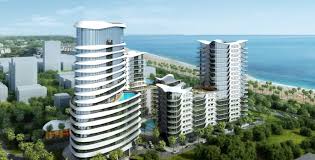Commercial Real Estate in Nigeria: Opportunities and Challenges
1. Introduction to Commercial Real Estate in Nigeria
Commercial real estate in Nigeria has grown into a key sector for investment, attracting interest from both local and international investors. As the largest economy in Africa and with a population that keeps increasing, Nigeria is full of opportunities for those who want to invest in properties like office buildings, shopping malls, industrial facilities, and warehouses. Even though Nigeria has faced economic challenges, the commercial real estate market in cities like Lagos, Abuja, and Port Harcourt remains strong, driven by urbanization and the need for more business spaces.
In commercial real estate, properties are used for business activities instead of homes. This includes a variety of buildings, such as office spaces, shopping centers, warehouses, and industrial complexes. As Nigeria continues to develop, there is a growing need for commercial properties, which makes this sector an attractive investment opportunity.
In this article, we will explain the different opportunities in commercial real estate, the benefits of investing, and the challenges you may face. We’ll also suggest strategies to help you succeed in this market.
2. Market Overview and Investment Potential
Nigeria’s commercial real estate market has shown steady growth, even when the economy faced difficulties. Cities like Lagos, Abuja, and Port Harcourt have seen an increase in the demand for offices, retail spaces, and industrial buildings. Nigeria’s large and growing population is moving to cities in search of jobs and better living conditions, increasing the need for business spaces.
Current State of Nigeria’s Commercial Property Market
The demand for commercial properties in Nigeria is higher than the available supply, especially in prime locations like Lagos and Abuja. This demand has driven up property prices and rental income, making commercial real estate an attractive option for investors.
Key Cities for Commercial Real Estate Investment
- Lagos: As Nigeria’s busiest city and financial hub, Lagos is the top destination for commercial real estate investment. Areas like Victoria Island, Lekki, and Ikoyi are known for high-quality office buildings and retail centers that offer good returns for investors.
- Abuja: As the capital city, Abuja is growing fast and needs more office buildings, especially in the Central Business District where government offices, embassies, and big companies are located.
- Port Harcourt: Known as an oil and gas hub, Port Harcourt offers opportunities for industrial real estate investments, such as warehouses and factories.
3. Key Opportunities for Commercial Real Estate in Nigeria
Nigeria’s commercial real estate market offers various investment opportunities across different property types.
Office Spaces: Meeting Business Demands
The demand for office spaces is growing as more businesses set up in cities like Lagos and Abuja. These businesses range from tech startups to multinational companies, creating a need for modern office buildings. Prime office spaces in popular locations offer high rental income, especially in busy business districts.
Retail and Mixed-Use Developments
Nigeria’s growing middle class has increased demand for modern shopping centers and retail spaces. Many shopping malls are being developed, combining shops, restaurants, and entertainment. Mixed-use developments are also becoming more popular, offering a mix of homes, offices, and retail outlets in one place. These kinds of properties offer convenience for residents and businesses, leading to higher returns for investors.
Warehousing and Industrial Properties
With Nigeria’s economy expanding beyond oil, there is more demand for warehouses and industrial spaces. As companies in logistics, e-commerce, and manufacturing grow, they need space to store goods and operate efficiently. Cities like Lagos and Port Harcourt are seeing more investments in these types of properties as businesses seek better storage and distribution solutions.
4. Benefits of Investing in Nigeria’s Commercial Property
There are several benefits to investing in commercial real estate in Nigeria:
High Returns on Investment (ROI)
Commercial properties generally offer higher returns than residential properties. In cities like Lagos and Abuja, office spaces, retail centers, and warehouses can generate attractive rental income, especially when located in high-demand areas.
Economic Growth and Business Expansion
As Nigeria’s economy grows, the demand for business spaces also increases. Sectors such as banking, telecommunications, and technology are expanding, which drives the need for more office buildings and retail centers. This growth offers great opportunities for commercial real estate investors.
Urbanization and Infrastructure Development
With more people moving to cities, the demand for business spaces in urban centers is increasing. At the same time, infrastructure improvements, like new roads and better transport systems, are making it easier for businesses to set up in these cities. As these developments continue, commercial real estate will become even more valuable.
5. Challenges Faced with Commercial Real Estate in Nigeria
Although there are many opportunities, there are also challenges that investors need to understand when investing in Nigeria’s commercial real estate market.
Infrastructural Deficiencies
One of the main challenges is the lack of basic infrastructure. In many areas, roads, electricity, and water supply are not reliable, which can make it harder to develop and manage commercial properties. Developers often have to cover the costs of providing these services, which increases the overall cost of the project.
Policy and Regulatory Hurdles
Navigating the legal and regulatory environment in Nigeria can be challenging. Obtaining permits and approvals can take a long time, and changes in government policies may affect investment plans. For example, property taxes or land use regulations can change unexpectedly, causing delays or increasing costs for investors.
Financing and Capital Constraints
Securing loans and financing for commercial real estate projects can be difficult due to high interest rates and strict requirements from banks. Many local banks offer loans with interest rates as high as 20-25%, which can make borrowing very expensive for developers. This is a significant challenge, especially for small and medium-sized investors.
6. Strategies for Overcoming Challenges
While the challenges in Nigeria’s commercial real estate market are significant, investors can overcome these obstacles by taking strategic steps.
Partnering with Local Experts
Local real estate developers and agents have valuable knowledge of the market and the regulatory environment. Partnering with local experts can help you understand the market better, identify potential risks, and find solutions to problems related to land acquisition, permits, and other legal issues.
Conducting Thorough Due Diligence
Before making an investment, it’s important to carry out thorough research on the property and the market. This involves checking the property’s legal status, assessing the demand for commercial spaces in the area, and analyzing the competition. Proper due diligence helps you avoid risks such as disputes over land ownership or poor investment decisions.
Leveraging Government Incentives
The Nigerian government offers incentives to attract investment in specific areas, such as tax breaks or subsidies for developing industrial parks or affordable housing. Investors should stay informed about these incentives and take advantage of them to reduce costs and maximize profits.
7. Navigating the Legal and Regulatory Framework
Understanding Nigeria’s legal and regulatory framework is essential for a successful investment in commercial real estate.
Key Laws Governing Real Estate Investment
Real estate in Nigeria is governed by several key laws, including the Land Use Act of 1978, which gives the government control over land. Investors should be aware of these laws to ensure that their property transactions are legal and that they have secure ownership.
Understanding Ownership Rights and Property Titles
One of the main risks in Nigerian real estate is the possibility of disputes over land ownership. Investors should work with legal professionals to ensure that they have clear and valid property titles. Without proper ownership documents, your investment may be at risk.
Dealing with Land Acquisition and Permits
Acquiring land and obtaining building permits can take time in Nigeria, especially in big cities. It is important to budget enough time for these processes and to work with professionals who can help speed up the approval process.
8. Financing Options for Commercial Real Estate Investment
Raising funds for commercial real estate projects can be challenging, but there are several options for financing.
Traditional Bank Loans
Commercial loans from Nigerian banks are the most common source of financing. However, due to high interest rates, these loans can be expensive. Investors must also meet strict requirements, such as providing collateral or showing a strong financial track record.
Real Estate Investment Trusts (REITs)
REITs allow investors to invest in real estate without directly owning the property. By investing in REITs, you can receive regular income from the rental profits of commercial properties. REITs are a growing part of Nigeria’s real estate market and can be a good option for investors looking for exposure to the sector without the risks of property management.
Private Equity and Foreign Direct Investment
Private equity firms and foreign investors are increasingly entering Nigeria’s commercial real estate market. These investors bring capital and experience, making it easier to fund large-scale projects like office complexes, shopping centers, or industrial parks.
9. Emerging Trends in Nigeria’s Commercial Property Market
As Nigeria’s economy grows, new trends are shaping the future of commercial real estate.
PropTech and Digital Innovations
Technology is transforming the real estate sector in Nigeria. PropTech, or property technology, is making it easier for investors to buy, manage, and sell properties. Online platforms allow investors to explore properties, analyze market trends, and manage their investments from anywhere.
Green Building and Sustainability Initiatives
Sustainable development is becoming a key focus for Nigerian real estate developers. Energy-efficient buildings and eco-friendly construction methods are gaining popularity. Investors are increasingly interested in green buildings, which are not only better for the environment but can also attract higher-paying tenants.
Flexible Workspaces and Co-Working Trends
The rise of co-working spaces is another trend reshaping Nigeria’s commercial property market. As more companies move toward flexible working models, the demand for co-working spaces is growing. These spaces provide affordable, flexible office solutions for startups, freelancers, and remote workers.
10. Risk Mitigation Strategies for Investors
To successfully invest in Nigeria’s commercial real estate market, it’s important to manage risks effectively.
Legal Due Diligence
Ensuring that all legal documents, such as land titles and contracts, are valid and up-to-date is critical for avoiding legal issues. Investors should work with experienced lawyers who understand Nigeria’s real estate laws.
Building a Diversified Portfolio
Diversifying your investments across different types of commercial properties, such as offices, retail centers, and warehouses, can help reduce risks. By spreading your investments, you can protect yourself from downturns in any one sector.
Understanding Market Dynamics
Staying informed about market trends, such as demand for certain types of properties and changes in government policies, is essential for making smart investment decisions. Investors who understand the market are better prepared to take advantage of new opportunities and avoid potential risks.
11. The Role of Government in Shaping the Market
The Nigerian government plays an important role in the commercial real estate market through policies, taxes, and investment incentives.
Real Estate Development Policies
Government policies focused on improving infrastructure and urban planning directly impact the real estate market. For example, ongoing road construction or new transport systems can make commercial properties more valuable by improving access and reducing traffic congestion.
Taxation and Incentive Programs
The government offers various tax incentives to encourage investment in commercial real estate. For example, investors may receive tax breaks for developing affordable housing or industrial facilities. These programs can help reduce costs and improve profitability for investors.
Public-Private Partnerships
Public-private partnerships (PPPs) are becoming more common in Nigeria, especially for large infrastructure projects. By partnering with the government, private investors can help fund projects like industrial parks or transportation hubs, which benefit the broader economy and create new opportunities for real estate development.
12. Analyzing the Future of Commercial Real Estate in Nigeria
Looking ahead, commercial real estate in Nigeria is set for continued growth. Urbanization, population growth, and infrastructure development will drive demand for more business spaces, while the government’s efforts to diversify the economy will create new opportunities for investors.
13. Case Studies: Successful Commercial Projects in Nigeria
Several successful commercial real estate projects highlight the opportunities in Nigeria’s market:
- Eko Atlantic City, Lagos: This large mixed-use project combines commercial, residential, and recreational spaces and is set to become a major business hub in West Africa.
- Central Business District, Abuja: Office buildings in Abuja’s Central Business District have attracted many businesses and government offices, boosting the area’s real estate value.
- Novare Gateway Mall, Abuja: This modern shopping center is a popular destination for shoppers and international brands, showcasing the growing demand for retail spaces.
14. Tips for International Investors
International investors interested in Nigeria’s commercial real estate market should consider the following tips:
Understand Local Market Dynamics
Take the time to research Nigeria’s local market, including its economic trends and consumer behaviors. Working with local experts and real estate firms can help you gain a better understanding of the market.
Partner with Reputable Real Estate Firms
Collaborating with reliable real estate firms in Nigeria can help you navigate the market more easily. Real estate firms like Giwa Realty, can assist with property management, legal compliance, and tenant relations.
Ensure Legal Compliance
Make sure you follow all legal and regulatory requirements, including obtaining necessary permits and ensuring property titles are valid. This will help you avoid potential disputes and protect your investment.
Conclusion
Investing in commercial real estate in Nigeria presents significant opportunities for high returns. The country’s growing population, expanding economy, and increasing demand for business spaces make it an attractive market for investors. However, challenges like infrastructure issues, regulatory hurdles, and financing constraints must be addressed with strategic planning. By partnering with local experts, conducting thorough research, and taking advantage of government incentives, investors can succeed in Nigeria’s dynamic commercial real estate market.
With cities like Lagos, Abuja, and Port Harcourt offering great potential for growth, now is an excellent time to explore the possibilities in Nigeria’s commercial property sector.





